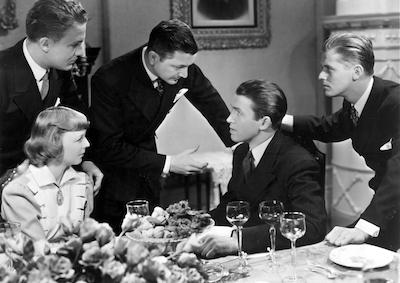Access every screening in the UCLA Festival of Preservation with a $50 pass.
Wings Over Mt. Everest (1935)
Preservation funding funding provided by The Packard Humanities Institute.
“It’s a real Screen Thrill,” chimed The Film Daily in its 1935 review of this Academy Award-winning short subject and that still holds true! With a gripping narration by Lowell Thomas, Wings Over Mt. Everest documents the historic 1933 Houston-Mt. Everest flights, named after the expedition’s financier, Fanny Lucy Radmall, a.k.a. Lady Houston, which marked the first ever flights over the peak of Mt. Everest. Two small planes with British-Gaumont camera people on board, climbed to 32,000 feet, then “the highest recording on film ever achieved,” to shoot breathtaking views of the then as yet conquered summit. (Edmund Hillary and Tenzing Norgay referenced Houston footage to plan their first successful climb in 1953.) Dramatic recreations of the expedition’s planning round out the documentary footage, “some of the grandest stuff ever caught by a camera.”
35mm, b/w, 22 min. Production: Gaumont British Picture Corporation. Distribution: Fox Film Corporation. Director: Geoffrey Barkas, Ivor Montagu. Producer: Richard Robinson. Cinematographer: S.R. Bonnett, A.L. Fisher, J. Rosenthal. Narrator: Lowell Thomas.
Preserved by UCLA Film & Television Archive in conjunction with the Academy Film Archive. Preserved from the nitrate dupe picture negative and 35mm BFI print. Laboratory services by PHI Film Laboratory, Audio Mechanics, Simon Daniel Sound, DJ Audio, Inc.
The Mortal Storm (1940)
Preservation funding provided by The Juanita Scott Moss Estate.
MGM’s first anti-Nazi film, The Mortal Storm, released in June 1940 before America officially entered World War II, is a melodrama surrounding the family of a Jewish professor who is sent to a concentration camp, while his daughter (Margaret Sullavan) attempts to escape across the border with a former student of the professor, played by Jimmy Stewart. The film was actually written by two refugees from Nazi Germany, George Froeschel (a former newspaper editor) and Paul Hans Rameau (a well-known scriptwriter, persecuted for being gay), who knew the Nazis first hand. What they created was essentially a melodrama about the destruction of a family at the hands of political forces beyond their control. It is only one of two films made in Hollywood during the war that actually explicitly identifies the victims of Nazism as Jews, the other being Andre de Toth’s None Shall Escape (1944).
At the beginning of the film we see the extended family of Prof. Roth (Frank Morgan) celebrating his 60th birthday, when the radio announces that Adolf Hitler has been named Chancellor of Germany. When the Professor presents a lecture in which he argues that there is no physiological difference between the blood of an Aryan and that of a Jew, his students demonstratively leave the lecture hall. His daughter’s two best friends symbolize different responses to Hitler. Robert Young becomes a dedicated Nazi Stormtrooper, while Jimmy Stewart is the upstanding democrat who believes in free speech and must eventually flee into exile. Unfortunately, the film flopped, probably because in 1940 most Americans were uninterested in the World War raging in Europe. When the film was released in neutral parts of Europe, though, Joseph Goebbels, the Nazi Propaganda Minister, banned all MGM films in German territories, in retaliation.—Jan-Christopher Horak
35mm, b/w, 100 min. Production: Metro-Goldwyn-Mayer. Distribution: Metro-Goldwyn-Mayer. Producer: Frank Borzage, Victor Saville. Director: Frank Borzage. Screenwriter: Claudine West, Hans Rameau, George Froeschel. Cinematographer: William H. Daniels. Cast: Margaret Sullavan, James Stewart, Robert Young, Frank Morgan, Robert Stack.
Restored by UCLA Film & Television Archive. Laboratory services by Fotokem, Audio Mechanics, Simon Daniel Sound, DJ Audio, Inc.






 Mobile Navigation
Mobile Navigation

